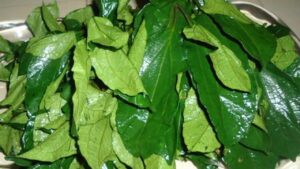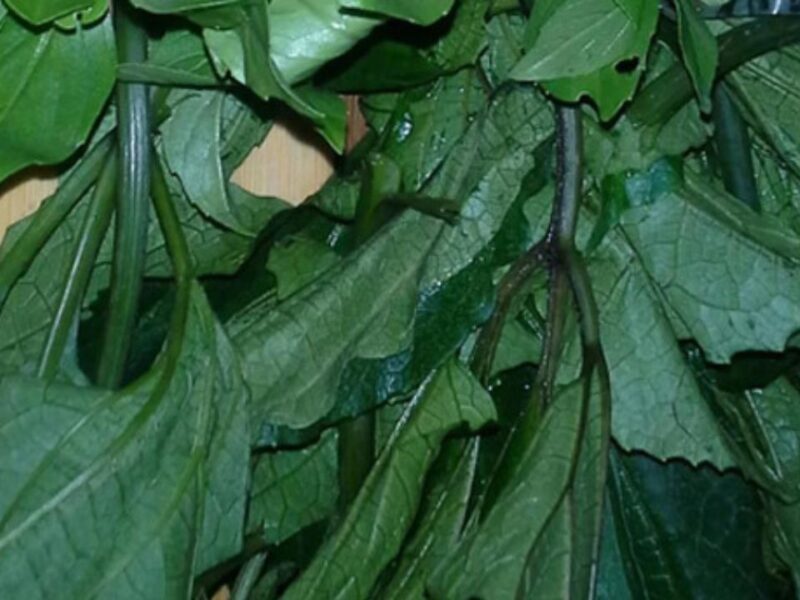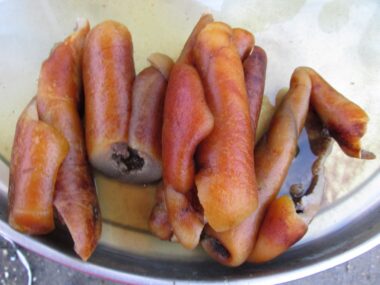Ugwu leaf, also known as fluted pumpkin leaf or Telfairia occidentalis, is a nutritious leafy green vegetable commonly found in West Africa, particularly in Nigeria. It is highly valued for its culinary uses and nutritional benefits.
Characteristics of Ugwu Leaf

- Appearance: Ugwu leaves are dark green and have a unique, fluted, or ridged texture on the surface, which gives them their name “fluted pumpkin.” The leaves can vary in size, with some being quite large.
- Flavor: Ugwu leaves have a slightly bitter and earthy flavor, which becomes milder when cooked. The taste is often described as similar to spinach or other leafy greens.
- Growth: The fluted pumpkin plant is a vine that produces both the leaves and the edible seeds. It is a fast-growing tropical plant commonly cultivated in home gardens and farms.
Culinary Uses
Ugwu leaves are a versatile ingredient in West African cuisine and are used in various dishes. Some common culinary uses include:
- Soups: Ugwu leaves are a popular addition to many traditional Nigerian soups, such as “egusi soup” and “vegetable soup.” They add a distinctive flavor and vibrant green color to the soups.
- Sautéed or Stir-Fried: Ugwu leaves can be lightly sautéed or stir-fried with onions, garlic, and spices to create a flavorful side dish.
- Salads: In some regions, young ugwu leaves are used in salads, often mixed with other vegetables.
- Stews: Ugwu leaves are sometimes added to stews for their nutritional value and flavor.
- Smoothies: Ugwu leaves can be blended into green smoothies for added nutrition.
Nutritional Profile
Ugwu leaves are highly nutritious and offer various health benefits. They are rich in:
- Vitamins: Ugwu is a good source of vitamins A, C, and K, which are essential for vision, immune function, and blood clotting.
- Minerals: It contains minerals like calcium, iron, magnesium, and potassium, which are important for bone health, red blood cell production, and overall well-being.
- Dietary Fiber: Ugwu leaves provide dietary fiber, which aids in digestion and helps maintain a feeling of fullness.
- Antioxidants: Ugwu contains antioxidants, such as beta-carotene and flavonoids, which help protect cells from oxidative damage.
- Protein contains moderate amounts of protein, making it a valuable addition to vegetarian and vegan diets.
- Folate: Ugwu is a good source of folate (vitamin B9), important for cell division and the prevention of neural tube defects during pregnancy.
Cultural Significance
Ugwu leaf is highly esteemed in Nigerian and West African cuisines. It is considered a traditional delicacy and a symbol of good nutrition. The leaves are often included in meals prepared for special occasions, family gatherings, and festivals.
However, in some Nigerian cultures, ugwu leaves are believed to have medicinal properties and are used in traditional herbal remedies. Additionally, the fluted pumpkin seeds are edible and used in various dishes and for their oil.
Ugwu leaf reflects the cultural richness and culinary diversity of West Africa, and it remains an integral part of the region’s traditional foods and culinary heritage.
In summary, ugwu leaf, or fluted pumpkin leaf, is a nutritious and versatile leafy green vegetable commonly used in West African cuisine. Its unique flavor, nutritional benefits, and cultural significance make it a cherished ingredient in a variety of dishes, particularly soups and stews.










